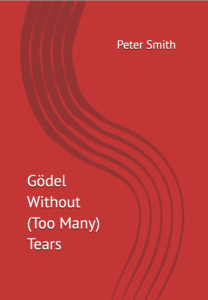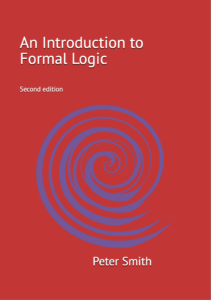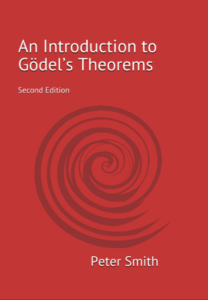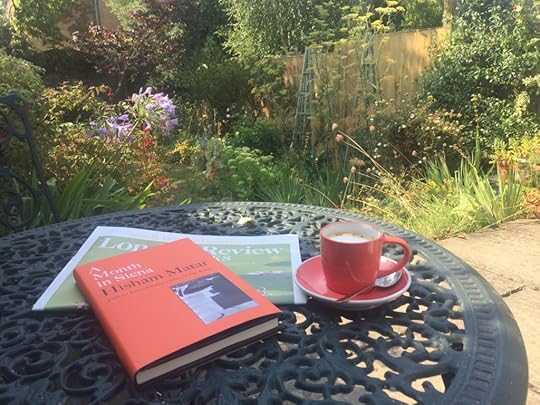Peter Smith's Blog, page 54
August 27, 2020
Slow Gödel coming
I now have most of a new version of Gödel Without (Too Many) Tears. It remains recognizably the same set of spruced-up lecture notes, but now better arranged, and significantly clearer at some points.
So here’s the plan. I’m going to post a chapter a day of the new version here on the blog, starting on Tuesday September 1st.
Comments/corrections/suggestions for improvement can then also be posted here; and I’ll try to respond to queries and questions day by day (though I’ll have to see how that goes). Hopefully that will prove useful both for some readers and for me!
The post Slow Gödel coming appeared first on Logic Matters.
August 23, 2020
Wigmore Hall concerts – and the Doric Quartet
The new season of concerts from Wigmore Hall promises to be wonderful. Free to view live, and then watchable on demand for a month after the concert. What more could we ask in these times, so difficult for live music? If we have any care at all for chamber music, lieder, or the like, and are fortunate enough to be in funds, then the least we can do is donate to Wigmore Hall, or up our membership level. And while we are waiting for the season to start three weeks hence, here are the Doric Quartet in characteristically fine form performing there (as they will be again in the new season), playing the Schubert G major Quartet.
The post Wigmore Hall concerts – and the Doric Quartet appeared first on Logic Matters.
August 22, 2020
Big Red Logic Book, no. 3?
 Well, not quite yet! But here’s the plan. I’ll finish a draft update of Gödel Without (Too Many) Tears in the next couple of weeks or so. Of course, I find myself tinkering more than I predicted I would, and adding a few bits and pieces. But then, what’s new? And I must try to keep things under control as I want these spruced-up lecture notes to stay reasonably short – no more than a third of the length of IGT, preferably less.
Well, not quite yet! But here’s the plan. I’ll finish a draft update of Gödel Without (Too Many) Tears in the next couple of weeks or so. Of course, I find myself tinkering more than I predicted I would, and adding a few bits and pieces. But then, what’s new? And I must try to keep things under control as I want these spruced-up lecture notes to stay reasonably short – no more than a third of the length of IGT, preferably less.
In September, I’ll post the new draft chapter by chapter here, one chapter a day, ideally hoping for some student feedback as we go along, pointing up any bits that don’t work too well (I’ll advertise). Then I’ll do a revised version, add a guide to further reading and an index, et voilà – there will be another Big Red Logic Book.
The post Big Red Logic Book, no. 3? appeared first on Logic Matters.
August 21, 2020
Big Red Logic Book, no. 2
 Exciting headline news. Like the Gödel book, IFL2 is now available as a freely downloadable PDF. There is also an inexpensive Amazon print-on-demand book, for those who want a hard copy. UK link; US link. (Find on your local Amazon by using the ASIN identifier B08GB4BDPG in their search field.)
Exciting headline news. Like the Gödel book, IFL2 is now available as a freely downloadable PDF. There is also an inexpensive Amazon print-on-demand book, for those who want a hard copy. UK link; US link. (Find on your local Amazon by using the ASIN identifier B08GB4BDPG in their search field.)
My apologies to anyone who bought the book at full price recently; but it was a surprise to me too that new publication arrangements became possible. Since I’m more interested in spreading the logical word than in totting up a few royalties (authors of logic books stand to make a fortune, of course …), I’ve decided to give the book away, or to provide access to a hard copy within a few pennies of the allowed Amazon minimum price. It’s a quite rotten time for students; so giving free/cheap access to decent learning materials when we can seems especially appropriate now. (Anyone thinking of using the book as a course text can be assured it will remain free.)
As I said about the Gödel book, the print-on-demand version is quite decently printed, but the cover isn’t great (I don’t just mean the design, but the way it lies), and the binding is too tight — you won’t mistake this for a paperback from a university press, for example. But on the other hand, it is a third of the price, so I don’t suppose anyone will complain too loudly.
A reminder: The first edition of IFL concentrated on logic by trees. Many looking for a course text complained about this. The second edition, as well as significantly revising all the other chapters, replaces the chapters on trees with chapters on a natural deduction proof system, done Fitch-style. Which again won’t please everyone! So the chapters on trees are still available, in a revised form, here on the website. But it was considerations of space in the printed version that led to the relegation of (versions of) those chapters to the status of online supplements. This was always a second-best solution. Ideally, I would have liked to have covered both trees and natural deduction (while carefully arranging things so that the reader who only wanted to explore one of these still has a coherent path through the book). With e-publication, the question of length isn’t so vital. So over the coming months, I may be inclined to revert to the inclusive plan, and so eventually produce a third edition. We’ll see. IFL3 is for the future. For the moment, enjoy the delights of IFL2!
The post Big Red Logic Book, no. 2 appeared first on Logic Matters.
August 20, 2020
Big Red Logic Book, no. 1
 I made the second edition of An Introduction to Gödel’s Theorems freely available as a downloadable PDF a few days ago (here’s the link again), announcing it on this blog and also on Twitter. And then, because someone also posted the link on Hacker News, the news spread far and wide. The book has now been downloaded over 64 thousand times. Which is just a little bit mad. I’m sure most downloaders didn’t want a 388 page book. Still, as I said before, I guess that it is good to know that the very mention of Gödel’s Theorems produced that much interest!
I made the second edition of An Introduction to Gödel’s Theorems freely available as a downloadable PDF a few days ago (here’s the link again), announcing it on this blog and also on Twitter. And then, because someone also posted the link on Hacker News, the news spread far and wide. The book has now been downloaded over 64 thousand times. Which is just a little bit mad. I’m sure most downloaders didn’t want a 388 page book. Still, as I said before, I guess that it is good to know that the very mention of Gödel’s Theorems produced that much interest!
And now, as promised, there is also a cheap print-on-demand version available from Amazon. It is already on Amazon UK and Amazon France, and should propagate quickly elsewhere. The ISBN is 9798673862131. Here’s the UK link.
This is a large format book, almost the same page size as the original CUP printing. OK, the bad news is that you don’t get a pretty cover (life is too short), and the binding isn’t quite up to the standards of a quality trade paperback. The printing and paper quality, however, is just fine. For anyone who (like me) usually prefers a physical book to reading onscreen, this reprint should be quite satisfactory enough. And the good news is that while the CUP version was £27.99, this one is just £7.99 in the UK (and comparable prices on other Amazons). So I guess no one can complain too much about that!
I do wonder though about the pricing policy of publishers for student books that have been already published for a number of years (and which have already more than covered their initial fixed costs in publishing). CUP are better than very many: but what would really justify £27.99?
But let’s leave that question hanging. News about Big Red Logic Book no. 2 tomorrow …
The post Big Red Logic Book, no. 1 appeared first on Logic Matters.
From a small corner of Cambridge, 10
 We are better placed than very many; but even so — five months in from the initial “lockdown”, and with so much still not returned to the old normal — it is sometimes difficult to maintain good spirits.
We are better placed than very many; but even so — five months in from the initial “lockdown”, and with so much still not returned to the old normal — it is sometimes difficult to maintain good spirits.
Travel has to be virtual. There’s another possible world, not that remote from this one, where we would have been spending quite a bit of our time living close to Siena. So, encouraged by the reviews, I was looking forward to Hisham Matar’s short book A Month in Siena. But I have to report that it is a grave disappointment. The book has its moments, but Matar’s descriptions of the city are uninspired, and his reactions to some Sienese paintings seem quite overblown and self-indulgent. A pity.
I was sorry to hear of the death a few days ago of Elliott Mendelson. I suppose I owe him my whole career. For his classic Introduction to Mathematical Logic was published just before I took Part II of the Philosophy Tripos (d0 the math!). Some questions in Tripos that year could be aced if you’d got your head round that then-new book. In particular, I recall a question on a possible misunderstanding of Gödel’s Theorem (yes, that!) which I could answer elegantly by just giving part of Mendelson’s proof which showed exactly where the misunderstanding would lie. So by that sort of happy chance, I did much better in tripos than I really deserved (for my knowledge after just a year of philosophy was so fragmentary), which meant I carried on with philosophy rather than going back to applied maths. And here we are …
Things falling out one way with respect to living near Siena; the serendipty of things falling out another way with respect to becoming a philosopher of sorts. Thoughts about such chancy events encouraged, too, by re-reading Kate Atkinson’s terrific Life after Life, where the narrative starts and restarts, again and again, small chance changes making for such different outcomes. Still her best book, I think.
Pointless to wonder just who is to blame for the depressing fiasco over the English A-level results. But it brings home, again, just what a rotten time this must be for students — those about to start (or indeed, wondering whether to start) at university, those mid-course, and indeed those just-finished and facing such diminished prospects. Grim.
 I’ve been struck by some of Vassily Kandinsky’s paintings for a long time. But I knew really embarrassingly little about his background, life and thought when I chose his Blue Painting for the cover of IFL2. So I’ve been reading the book of essays edited by Helmut Friedel and Annegret Hoberg. Which perhaps tells me just a bit more than I needed to know.
I’ve been struck by some of Vassily Kandinsky’s paintings for a long time. But I knew really embarrassingly little about his background, life and thought when I chose his Blue Painting for the cover of IFL2. So I’ve been reading the book of essays edited by Helmut Friedel and Annegret Hoberg. Which perhaps tells me just a bit more than I needed to know.
But, with some judicious skimming, the essays are indeed fascinating for someone as ignorant as I am about the birth of modernism and its roots. And the book’s many illustrations are terrific. Art books these days can be produced to a wonderful standard — cheaply too, at least for someone used to academic book prices, even for student texts. (Speaking of which, see the upcoming next post …)
The post From a small corner of Cambridge, 10 appeared first on Logic Matters.
August 17, 2020
Counting down to a new paperback version of IGT
 Encouraged by a helpful ‘how to’ email from Richard Zach (thanks!), I’m setting up a print-on-demand paperback reprint of the corrected second edition of An Introduction to Gödel’s Theorems. And the good news is that it will be a third of the price of the previous CUP version (ok, it won’t have the prettier cover, and the paper quality isn’t so good: but otherwise, it isn’t at all shabby). I’m impatiently awaiting a second proof copy, as I needed to adjust the margins from the first proof, and I also want to see whether the alternative paper choice works better. But all being well, this will become available within a week.
Encouraged by a helpful ‘how to’ email from Richard Zach (thanks!), I’m setting up a print-on-demand paperback reprint of the corrected second edition of An Introduction to Gödel’s Theorems. And the good news is that it will be a third of the price of the previous CUP version (ok, it won’t have the prettier cover, and the paper quality isn’t so good: but otherwise, it isn’t at all shabby). I’m impatiently awaiting a second proof copy, as I needed to adjust the margins from the first proof, and I also want to see whether the alternative paper choice works better. But all being well, this will become available within a week.
I’ve used the Amazon KDP service (despite reservations). But for this sort of project it seems the best option on various counts; and they won’t make an additional fortune from the likely low sales at almost the minimum allowed price.
Having got the hang of this self-publishing business, a more exciting possibility is opening up. Watch this space …
The post Counting down to a new paperback version of IGT appeared first on Logic Matters.
August 16, 2020
The Belcea Quartet play Beethoven

There will more logic news about the Gödel book (becoming available as an inexpensive print-on-demand book), about Gödel Without Tears, and also about IFL2 (and IFL3!) before the end of the month. Meanwhile, here are the Belcea Quartet, playing the first and third Razumovsky quartets a week ago at the Salzburg Festival.
The post The Belcea Quartet play Beethoven appeared first on Logic Matters.
August 8, 2020
Interest in Gödel? Just a bit!
Yesterday, just after I posted here about the availability now of my Gödel book as a free PDF download, I tweeted the same news, and that tweet was retweeted dozens of times.
After 24 hours, the book has been downloaded … over 47 thousand times.
Which is a bit crazy.
The Daughter immediately had the explanation. Someone had posted a link on Hacker News, giving just the title with a direct link (but not explaining that An Introduction to Gödel’s Theorems is a long book!). And that link stayed on the front page of Hacker News for quite a while. No doubt most of those who clicked through, not reading the comments that pointed out that it is a book, and perhaps thinking they were going to download a quick read, were surprised by what they found!
But still, I guess that it is really rather good to find that so many were tempted to follow up a link to something on Gödel’s theorems. The topic (rightly!) remains of considerable interest, even fascination. Which certainly encourages me to crack on and finish reworking the cut-down version of the book, the lecture notes Gödel Without Tears. And who knows, a few people might even read the book!
The post Interest in Gödel? Just a bit! appeared first on Logic Matters.
August 7, 2020
Gödel news!
As I said in my previous post, I’ve been working on a revised version of Gödel Without Tears. Predictably, I’ve not been able to resist tinkering more than I had planned to do. So it will take a few weeks more to finish the job. But I’m not complaining: it’s an enjoyable enough project!
GWT is a sort of cut-down introduction to some of the themes of my Gödel book. Quite unexpectedly, I have now acquired the rights to that book. I think the friendly thing to do is to immediately make the second edition of An Introduction to Gödel’s Theorems available as a free PDF downloadable from Logic Matters, taking the opportunity to correct three dozen minor misprints. This way, students and other readers anywhere can get free access. So here it is! Spread the word …
(I may in due course also make this corrected version of the book available as an inexpensive print-on-demand book via Amazon, for those who want a physical copy. But I doubt that there would be a big demand for that, so one step at a time.)
The post Gödel news! appeared first on Logic Matters.



